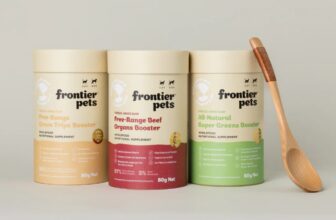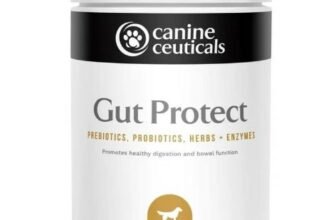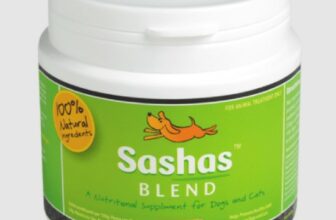Joint supplements for dogs (in Australia)

Did you know 1 in 5 dogs over 1 year of age suffer some form of osteoarthritis?
By the age of 8, statistics show 4 in 5 dogs are affected by osteoarthritis alone.
You don’t want your dog to be one of them.
Feeding some oily fish, green-lipped mussels, or bone broth can support joint health for any dog, but if your dog’s currently suffering from joint-related issues you can definitely benefit from a good joint supplement.
In this guide to joint supplements for dogs in Australia, we’ll take a look at the different brands available, including vet recommended joint supplements.
I also recommend taking a look at your dog’s current diet if you haven’t already. Many dog foods in Australia aren’t very good and can actually promote poor joint health. Feeding a poor diet with a joint supplement is an expensive way to fail.
This guide will cover the following:
Why would you give your dog a joint supplement?
If your dog is healthy and their joints are in good shape, then have a read of this guide to joint-support treats. It covers treats for dogs with arthritis, but the recommendations on that page are a great preventative – especially if you have an active breed or large breed prone to poor joint health.
Joint supplements can be expensive, but are worth considering if your dog fits one of the following:
- Arthritis – Very common in dogs, even from the age of 1, arthritis is a swelling of the joints which causes discomfort, stiffness, and pain. This often starts off as silent pain our dogs can’t verbalise, and we often fail to notice.
- Injury or trauma – It’s easy for a dog to injure their joints while at play, running around, or chasing a ball. As our dog’s age the possibility of such an industry increases exponentially, and like arthritis such an injury often goes unnoticed.
- Genetic predisposition – Some breeds are known for joint problems, including German Shepherds, Labradors, Retrievers, and others. Large breeds commonly have a genetic predisposition, and some small breeds do too. Common joint genetic joint problems include hip dysplasia and elbow dysplasia.
- Obesity – The heavier your dog, the more stress to their joints. A joint supplement will definitely help, but only when combined with a weight management plan and exercise. There’s a guide on weight loss dog foods you can take a look at.
- Old age – The affects of old age are inevitable, and joint cartilage will slowly deteriorate. A good diet or joint supplement will help prevent the effects of old age, and keep our dogs pain-free and active as long as possible.
- Post-surgery recovery – After orthopedic surgeries or joint procedures, joint supplements are often recommended by your vet (for good reason) to support the recovery process and help heal damaged tissue.
If you have a large breed, active breed, or working dog, then a joint supplement or some form of joint support is well worth considering as a preventative. If this is your dog, refer to the section below for specific tips for these breeds.
Vet recommended joint supplements – 4Cyte Canine & Antinol Rapid
The most common brands of joint supplements recommended by Australian vets are 4Cyte Canine Joint Support and Antinol Rapid.
Both brands are proven to really improve joint health, and many dog owners report far better joint health within only a few weeks.
To compare the two, both are made from all natural ingredients, but 4Cyte canine has four inclusions rather than Antinol Rapid which only has two.
Antinol Rapid seems to be the safest bet, especially if your dog tends to suffer dietary intolerances, but 4Cyte Canine is the more well rounded.
To quickly compare, 4Cyte Canine is made from green-lipped mussel, shark cartilage, biota orientalis seed oil, and abalone, and Antinol Rapid is green-lipped mussel and Antarctic krill.
4Cyte Canine comes as little pellets you can easily add to your dog’s food, and Antinol Rapid comes as gel capsules which you can cover in peanut butter (100% peanuts only) to entice your dog to eat them.
Both brands are expensive, but you may find them cheaper from an online retailer than you would from your vet.
4Cyte Canine
My retailer of choice is Pet Circle, who I find the most reliable and usually the most competitive, but 4Cyte Canine can be found from a variety of retailers.
Antinol Rapid
Antinol Rapid seems to be more readily available in pet stores, vets, or online.
As vet recommended joint supplements, you will find your local vet will stock either 4Cyte Canine or Antinol Rapid, as should your local pet store.
Both 4Cyte Canine and Antinol Rapid are scientifically proven to improve joint health and reduce inflammation, and are therefore recommended.
Other joint supplements in Australia
There are some great joint support supplements in Australia, and you will find the ingredients vary significantly.
It’s important to be aware of the difference between joint supplements and joint treats, so let’s discuss that first:
The difference between joint supplements and joint treats
What you should be careful of is treats marketed for “joint health” or “joint support” when the reality is they’re cheaply made treats with a sprinkling of something known to be beneficial for joint health.
Dog foods branded for “joint support” don’t tend to be much better.
Before getting into some recommendations for joint supplements, let’s quickly cover brands you’ve already seen in the supermarket and why I wouldn’t recommend them for joint health (or overall health).
Feel free to skip reading these if you simply want recommendations for joint supplements.
- Drool Joint Protect Treat Balls (Many retailers) – As promoted by much-loved celebrity vet Dr Chris Brown who I’m sure does very well financially promoting grain-based products for our carnivorous pets, the Drool Joint Protect treats have “chicken breast” listed first on the ingredients but then a whole load of stuff like vegetable glycerin, dextrose (sugar), potato, tapioca, barley, and oats. So don’t go thinking these treats found at Woolworths, Petbarn, and Petstock are meaty, and despite having small inclusions of glucosamine, chondroitin, collagen, and fish oil for joint health, these are minor additions to what are essentially just dog treats.
- Vetalogica VitaRapid Joint Care Daily Treats – You may be surprised to see these Vetalogica treats listed here, and although I consider Vetalogica a decent brand these treats serve as a good comparison to the recommended joint supplements I will mention shortly. You see, the ingredients beneficial for joint health are in small amounts, most listed after salt (around 1%), with the real main ingredients being sweet potatoes, chickpeas, and dextrose (sugar) as well as chicken meal even though it’s listed first. In fairness, I would consider the Vetalogica VitaRapid treats better than the others on this list, but I would still consider them treats rather than a joint supplement.
- Happy Tails Joint & Flex Treats (at Bunnings) – Ignore the big letters “HEALTH CHEWS” on the tub, these are mostly tapioca, potato, meat/by-products, and glycerine with some token inclusions for joint health like green lipped mussel powder (probably less than 1%). Questionable benefit for joint health, wouldn’t you agree?
- Doggylicious Doggy Butter (at Woolworths) – I have to say this hip, joint, and coat treat isn’t too bad from an ingredients perspective, and I’d have no concerns giving it to my dog. It contains collagen and turmeric which are both beneficial for joint health, but as it’s essentially a tub of peanut butter (100% peanuts) you have to wonder if it’s worth the price – around triple the price of a regular jar of peanut butter?
Related: If you’re looking for good treats for joint health or arthritis then here’s a guide to joint support treats.
Recommended joint supplements for dogs in Australia
If 4Cyte Canine or Antinol Rapid haven’t won you over, there are some excellent joint supplements in Australia which may prove cheaper and possibly equally as beneficial.
Once you’ve considered your dog’s main diet and made sure it’s good for them, here are some recommendations of joint supplements:
Sasha’s Blend Joint Health
Sasha’s Blend comes as a powder and is 100% pure and natural with ingredients conforming to strict international conservation requirements.
The ingredients in Sasha’s Blend are all beneficial for joint support, unlike the “treats” listed above, being a combination of stabalised green-lipped mussel, abalone, and marine cartilage. These are excellent inclusions to support or prevent joint issues in dogs, or relieve pain and inflammation.
Sasha’s Blend would be a very good choice, and should be considered equally as good as vet recommend joint supplements like Antinol and 4Cyte.
GLYDE Mobility Chews for Dogs
The GLYDE mobility chews are very convenient as you don’t need to faff around adding them to food or wrapping them in peanut butter – just give them to your dog.
They’re mostly green-lipped mussel which are great for joint health, combined with glucosamine and chondroitin as the most recommended inclusions in a joint supplement.
Research has shown the combination of glucosamine and chondroitin support joints in many ways, including lubrication, cartilage support, and reducing inflammation, which is why they’re commonly used in joint supplements, treats, or dog foods labelled for joint support.
The GLYDE Mobility Chews will be a good option for you if you like the convenience of simply chucking your dog a chew, daily. They come as either a 60 pack or 120 pack, and it’s much more efficient to buy as 120.
Joint Guard
Another brand of joint supplement readily available in Australia is Joint Guard.
This brand has an excellent reputation when you read consumer reviews, and will benefit you if you have a larger breed dog (or dogs) as it comes in a big 400g tub which should go some distance.
Joint Guard differs is a combination of glucosamine hydrochloride and sodium chondroitin sulfate. Unlike all the other joint supplements above, Joint Guard doesn’t have green-lipped mussels. If that’s an issue for you, stock up on green-lipped or blue-lipped mussels at your local supermarket, and give them to your dog as well (1 a day, or 1 every other day) – may work out cheaper that way!
Eureka Joint & Mobility Dehydrated Bone Broth
I’m adding in the Eureka joint supplement as an alternative as it’s an Australian brand I’ve come to very much respect. I’m also a huge advocate for bone broth, and it makes a lot of sense to me to combine bone broth with other ingredients beneficial for joint support.
The Eureka Joint & Mobility Bone Broth comes in powder form, made from bone broth powder, soy protein powder, and functional ingredients great for joint support and health in general – inulin (digestive health), MSN (anti-inflammatory), glucosamine (joint support), chondroitin (joint support), rosa canina (great for immunity and heart health), and manganese (also great for health and wellbeing).
The powder also contains pre and probiotics to help your dog better absorb these nutrients and digest their food better in general.
Although not a purist joint supplement, Eureka Joint & Mobility is a really nice supplement for joints and wellbeing, and an excellent introduction into the Eureka range of quality pet foods in general – read the Eureka review for more information.
Joint health of large breeds, active breeds, and working dogs
Diet is the best preventative against joint problems if your dog is a large breed, active breed, or working dog.
Usually it’s these breeds who have the worst diets, and the result of this can be expensive vet bills or heartache as your dog reaches middle to old age.
The reason for this is simple – large dogs and active dogs eat more, and dog food is expensive.
I readily admit the dog foods on the best-rated list can be bank-breakers, and those on the affordable dog food list aren’t much cheaper either.
Most of us have a tight budget, and we can only do the best when it comes to our dog’s main diet, but there are ways to prevent health risks, and supporting joint health doesn’t need to be expensive.
In my experience most working dog foods are the least nutritious, and I say that as a certified pet nutritionist. If you compare a working dog food to any mid-range dog food you’ll find they’re mostly wheat or cereal grains. There are two reasons for this – (1) it’s the cheapest way to produce a dog food and legally sell it, and (2) it means a good profit can be made from you and your dog despite selling the food for a price you consider affordable.
Note in the above, neither point 1 or 2 means the working dog formula is health for your dog, but they’ll likely burn off the carbohydrates, calories, and sugars more than a regular dog which would likely become sick, fat, and lethargic on such a poor diet.
If you have a large breed, active breed, or working dog, these are your options in order of joint-health benefit (not accounting for cost):
- Feed a nutritious, species appropriate diet – For any dog, this is a meat-based diet, or fish-based, with good quality animal fat, healthy oils, and perhaps some other inclusions selected for health-benefits, not profit making.
- Add a joint-support supplement – A good joint supplement will benefit any dog, more so a large breed, active breed, or working dog. They’re expensive, but the ingredients will directly benefit your dog’s joints (and likely their health in general).
- Add fresh foods which support joints – Throw those wheat and sugar-based treats in the bin, and give your dog the odd frozen whole sardine instead. There are many foods you can add to your dog’s diet which are both cheap and very beneficial for joint support. I mentioned green-lipped mussels and bone broth at the start of this guide, but fresh (raw) meats, animal fat, eggs, coconut oil, and more, can all boost your dog’s joint health.
Joint health in old age dogs
Senior dog foods are a bugbear of mine.
It really annoys me how bad some senior dog foods are at a time in life where your dog needs a healthy diet more than ever to support their joints and overall health.
You see, an adult dog food may be 30 to 40% meat and animal fat combined with a range of ingredients to keep production costs down and profits up.
Older dogs are palmed off with an even worse formula, using the excuse they don’t need as much good stuff because they’re slow, less active, and will die soon anyway.
Most of the time we put the health issues of our dog down to old age or bad luck, which is why senior dog foods are rarely consider a cause of ill health.
Take a look at the ingredients of some senior dog foods and compare them to adult or puppy formulas. You’ll see what I mean – less protein, less fat, less meat, more carbohydrates from cheap ingredients like grain or potato.
A good joint health supplement will very likely support your dog’s joint health in older years, keeping them active, with less painful inflammation, and of course much happier.
Here are your options to support the joints of your older dog:
- Feed a nutritious, species appropriate diet – Keep in mind your old age dog will need quality meat protein to keep their muscles strong and healthy, and quality animal fats to lubricate their joints. Most dog foods skimp on these essential ingredients, but a good dog food will more than cater for your older dog’s needs. Avoid senior dog foods high in carbohydrates, and feed them a more species-appropriate diet instead.
- Add a joint-support supplement – A good joint supplement will benefit your older dog more than ever before in their lifetime, as most old dogs suffer osteoarthritis or easily injure their joints. They’re expensive, but also contain ingredients like glucosamine, chondroitin, shark cartilage, and more, in concentrations hard to provide with regular dog foods or joint-health treats.
- Add fresh foods which support joints – We love to give our dogs treats, and our older dogs deserve them more than ever, but throw away any treats which aren’t rich in meat or entirely beneficial ingredients. There’s a guide to healthy treats here, but fresh foods like green-lipped mussels, eggs, coconut oil, bone broth, and more, will be very good for supporting the joint health and wellbeing of your senior dog.
References and further research
- National Library of Medicine – Prevalence, duration and risk factors for appendicular osteoarthritis in a UK dog population under primary veterinary care







What do you think of Petz Park hip & Joint? I give that to my nearly 9 year old German Shepherd.
Hi, Thanks for the above great review.
Just wondering if it would be possible to add New Zealand Deer Velvet Canine Super Supplement to the reviews, as it has been recommended by local Pet Nutritionist but very expensive so would be good to see an impartial review on it before buying. https://imperialpetco.com/product/super-supplement/
11yr old staffy with arthritis. 10mths of Rose Hip Vital of no help.
Gabapentin 100mg daily from vet is helping. Have also added Wagners Green Lipped Mussel 500mg/day from Chem Whse and hard to tell if that’s added any improvement or not but cost effective so will continue it.
Jenlin, did they ever do a review?
I have friends that have used this product and rave reviews from all, but would be interested to see what they say here.
Thank you for this summary.
I have a 6-month-old bull arab x cattle dog. We are prioritising feeding him a good diet with a mix of pre-made raw and high-quality kibble. So we’re wondering whether we should also look at adding a supplement such as those discussed above as a preventative. No symptoms at the moment but we’re aware he is at higher risk for hip dysplasia and associated issues. Any advice appreciated.
I have a 10Kg 7 year old Jack Russel/Fox terrier that has just started the occasional skip in his rear legs apparently common with the breeds.
He has been on PetzPark Hip & Joint supplements for several weeks with no discernable results. He doesn’t mind me Massaging the hip & joint so I assume little or no pain.
We are off to the vet today for annual Vaccinations & an opinion on the condition & treatment.
Your opinion on Petz park various supplements would be welcome.
Your Pet Food reviews have been of great benefit leading to Freddies Petzyo Kibble & Big Dog diet along with a few meaty bones . His teeth are excellent for his age.
Hi Glen, with my dog (a 7 year old over-active border collie) I give her a variety of foods to prevent joint issues – salmon when we have salmon for dinner, sardines, eggs, mussels, or anything else suitable, combined with a good diet. Supplements can work extremely well both as a preventative and somewhat of a cure, but are also expensive. Offering a variety of foods beneficial for joint health should go a long way, and likely beneficial for other aspects of health as well.
I bought some glucosamine and chrondroitin powder from Mighty Munch, it’s been almost a month, and my 17 year old chihuahua does seem a lot happier, he’s trotting around rather than plodding. Not very scientific.